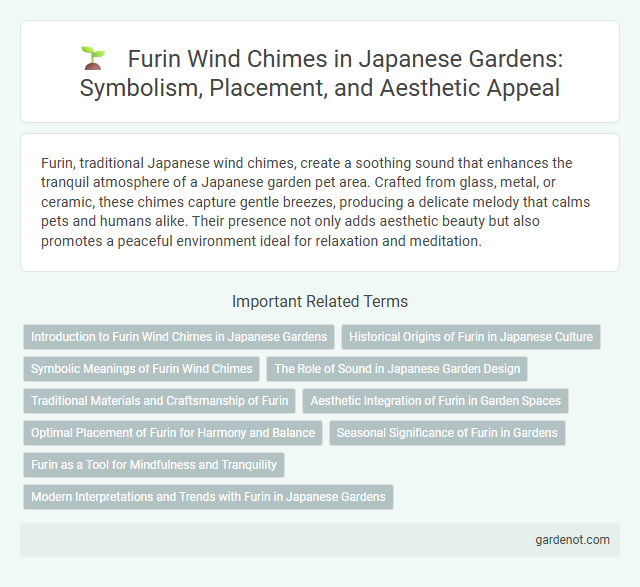Furin, traditional Japanese wind chimes, create a soothing sound that enhances the tranquil atmosphere of a Japanese garden pet area. Crafted from glass, metal, or ceramic, these chimes capture gentle breezes, producing a delicate melody that calms pets and humans alike. Their presence not only adds aesthetic beauty but also promotes a peaceful environment ideal for relaxation and meditation.
Introduction to Furin Wind Chimes in Japanese Gardens
Furin wind chimes are traditional Japanese ornaments crafted from glass, metal, or ceramics, hanging from eaves or trees in Japanese gardens to create soothing sounds when stirred by the breeze. These chimes symbolize the arrival of summer and are believed to ward off evil spirits while promoting relaxation and mindfulness. Their gentle, melodic tones enhance the tranquil atmosphere, connecting visitors to nature's subtle rhythms.
Historical Origins of Furin in Japanese Culture
Furin, the traditional Japanese wind chime, traces its origins to ancient China before being adopted and transformed during the Edo period in Japan, symbolizing the arrival of summer and evoking a sense of tranquility. These glass or metal chimes were historically hung on sliding doors and verandas in Japanese gardens to create soothing sounds that harmonize with natural surroundings. The cultural significance of Furin lies in its association with seasonal change, spiritual protection, and aesthetic beauty within Japanese garden design.
Symbolic Meanings of Furin Wind Chimes
Furin wind chimes in Japanese gardens symbolize the harmonious flow of energy and the arrival of summer breezes, creating a serene atmosphere. The gentle, melodic sounds are believed to ward off evil spirits and attract good fortune, embodying protection and positivity. Their presence enhances mindfulness and the appreciation of transient beauty, reflecting core principles of Japanese aesthetics and spirituality.
The Role of Sound in Japanese Garden Design
Furin, traditional Japanese wind chimes, play a crucial role in enhancing the sensory experience of Japanese garden design by introducing soothing, melodic sounds that complement natural elements like rustling leaves and flowing water. The gentle tinkling of furin not only evokes a sense of tranquility but also reflects the seasonal changes, particularly summer breezes, guiding visitors' emotional connection to the landscape. By integrating sound as a vital element, Japanese gardens achieve a harmonious balance between visual aesthetics and auditory serenity.
Traditional Materials and Craftsmanship of Furin
Furin, traditional Japanese wind chimes, are meticulously crafted using materials such as glass, metal, ceramics, and bamboo, each selected for their unique acoustic properties and cultural significance. Artisans employ time-honored techniques, including hand-blown glass shaping and intricate metal engraving, to produce delicate sounds that embody the seasonal essence of Japanese gardens. The craftsmanship of Furin not only enhances the serene ambiance but also reflects Japan's deep-rooted appreciation for harmonic balance and natural beauty.
Aesthetic Integration of Furin in Garden Spaces
Furin wind chimes enhance the serene ambiance of Japanese gardens through their delicate soundscapes, complementing natural elements like water features and bamboo groves. Crafted from materials such as glass or metal, these chimes visually blend with the garden's minimalist design while offering subtle auditory stimulation that encourages mindfulness. Their placement near pathways and seating areas amplifies the sensory harmony, fostering a meditative environment integral to traditional Japanese garden aesthetics.
Optimal Placement of Furin for Harmony and Balance
Optimal placement of furin in a Japanese garden involves hanging the wind chime near entrances, pathways, or water features to enhance auditory harmony and spiritual balance. Positioning furin where gentle breezes flow ensures a soothing, rhythmic sound that complements the garden's natural elements. Properly placed furin fosters a meditative atmosphere, aligning with the principles of feng shui for tranquility and positive energy.
Seasonal Significance of Furin in Gardens
Furin, traditional Japanese wind chimes, hold deep seasonal significance in gardens by symbolizing the cool breeze of summer and providing a soothing auditory experience that contrasts with the season's heat. Their delicate sounds evoke a sense of tranquility and mindfulness, enhancing the garden's atmosphere during warm months. Often hung beneath eaves or trees, furin visually and sonically represent the transition between seasons, especially from summer to autumn.
Furin as a Tool for Mindfulness and Tranquility
The gentle sound of the Furin wind chime fosters mindfulness by encouraging present-moment awareness through its soothing, melodic tones. Traditionally crafted from glass or metal, Furin create a calming atmosphere that enhances meditation and stress relief in Japanese gardens. Their subtle, rhythmic chimes help cultivate tranquility and connect individuals to nature's serene ambiance.
Modern Interpretations and Trends with Furin in Japanese Gardens
Modern interpretations of furin in Japanese gardens blend traditional glass craftsmanship with contemporary design, incorporating minimalist shapes and bold colors that complement urban landscapes. Designers increasingly use solar-powered or electronically enhanced furin that chime with variable tones, reflecting advances in technology while maintaining cultural symbolism. Trends emphasize sustainability and personalization, allowing garden enthusiasts to select furin styles that harmonize with seasonal changes and individual aesthetics.
Furin Infographic

 gardenot.com
gardenot.com